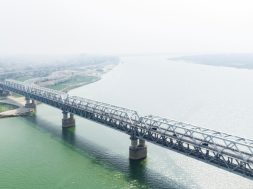Gujarat has over 50% of PPP port projects under operation: ASSOCHAM
Gujarat has over 50% of PPP port projects under operation: ASSOCHAM
Gujarat is showing other states how to grow, even in ports sector under the public-private partnership model
Gujarat accounts for lion’s share of over 50 per cent in value terms for the total number of completed projects in the ports sector that have been put to service delivery under the public-private partnership (PPP) model as of April 30th according to a just concluded study by apex industry body the Associated Chambers of Commerce and Industry of India (ASSOCHAM).
Of the total 31 PPP port projects worth over Rs. 24,700 crore under operation in India as of April 30th, Gujarat accounts for 12 completed PPP projects worth over Rs.? ?12,400 crore, according to the study titled “Port Developments in India” conducted by ASSOCHAM.
Besides, Gujarat ranks 6th with four PPP-based port projects worth over Rs. 1,650 crore under construction.
“Out of the total 881 PPP projects worth over Rs. 5.4 lakh crore taken up under the PPP model across India, 62 projects in the port sector worth over Rs. 82,000 crore are in the different stages of implementation,” said D.S. Rawat, National Secretary General, ASSOCHAM while releasing the chamber’s study.
“While 21 PPP projects in the port sector with a share of 52 per cent worth over Rs. 43,000 crore are under construction, eight projects worth about Rs. 14,000 crore with a share of about 17 per cent are under bidding,” said Mr Rawat. “Of the remaining, one project is in the expression of interest stage (EOI) and one has been cancelled.”
With two port projects worth over Rs. 4,100 crore completed and put to operation in the PPP mode, Odisha ranks second with a share of about 17 per cent followed by Maharashtra where five projects worth over Rs. 3,700 crore are under operation, according to the ASSOCHAM study.Andhra Pradesh and Tamil Nadu each with three projects under operation have garnered a share between 5-6 per cent followed by Kerala (2.8 per cent).
With three port projects worth over Rs.20,000 crore under construction, Andhra Pradesh has the maximum share of over 46 per cent in this category, highlighted ASSOCHAM study.
Maharashtra, Kerala, Odisha and Union Territory of Pondicherry are other regions with maximum share ranging between 7-16 per cent in the PPP projects worth over Rs. 2,900-6,700 crore under construction.
With two projects worth over Rs. 5,500 crore, Kerala has the maximum share of about 40 per cent in the PPP ports projects under bidding. Maharashtra and Karnataka are other states with a share of over 37 per cent and 23 per cent in this category.
Besides, with a share of over 53 per cent, Gujarat also tops the list amid nine maritime states as it could create almost double the capacity at the minor ports than was envisaged in the 11th plan.
“Minor ports in Gujarat had a capacity of 182 million tonnes as on March 31st, 2007 and the state was expected to add about 56 million tonnes capacity during the 12th Plan (2007-12), while the state had realised capacity addition to about 283.6 million tonnes up to March 31st, 2011, i.e. actual capacity addition of 101.6 million tonnes during the first 4 years of 12th Plan,” highlighted ASSOCHAM study.
“The total capacity of India’s nine maritime states, namely, Andhra Pradesh, Goa, Gujarat, Karnataka, Kerala, Maharashtra, Odisha, Pondicherry and Tamil Nadu as on March 31st, 2007 was about 228.3 million tonnes which was expected to add about 337.4 million tonnes during 2007-12, and the total capacity realized as on March 31st, 2011 was 418.3 million tonnes, thereby adding about 190 million tonnes during the first 4 years of the 12th Plan,” said Mr Rawat. “Odisha is the only the 2nd state after Gujarat which realised actual capacity addition of about 23 million tonnes from zero capacity during the first 4 years of 12 Plan, thereby by exceeding the expected capacity addition between 2007-12 which was about 13.2 million tonnes.”
The ports sector needs policy attention as there not only exist severe capacity constraints and operational inefficiencies, but also certain models on how to address these issues.
Considering India’s port infrastructure is not at par with the global standards, the inefficient port services pose severe challenges to India’s trade as the inefficiency and non-competitiveness of India’s ports results in higher costs apart from the turnaround time at ports.
“There is an urgent need to modernise India’s ports as the existing ports are plagued with a plethora of problems like congestion, poor connectivity, accessibility and lack of adequate facilities,” said Mr Rawat. “There is a huge scope for investments in development of port infrastructure which needs to develop fast and the capacity utilization must also be improved.”
The 12th Plan objective of attracting more than Rs. 1 lakh crore private investments for developing non-major ports turns out to be an ambitious target unless and otherwise their 12th Plan performances are evaluated in proper spirit. The concerned states must seriously consider incorporating the success strategies of others for better fulfilment of the plan objectives, suggested the apex chamber.
Cookie Consent
We use cookies to personalize your experience. By continuing to visit this website you agree to our Terms & Conditions, Privacy Policy and Cookie Policy.






